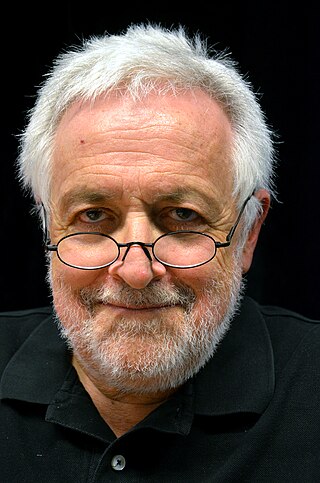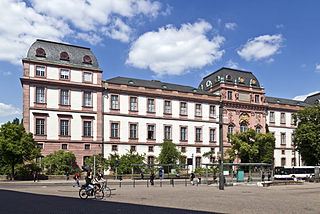
The GSI Helmholtz Centre for Heavy Ion Research is a federally and state co-funded heavy ion (Schwerion) research center in the Wixhausen suburb of Darmstadt, Germany. It was founded in 1969 as the Society for Heavy Ion Research, abbreviated GSI, to conduct research on and with heavy-ion accelerators. It is the only major user research center in the State of Hesse.
The German orthography reform of 1996 was a change to German spelling and punctuation that was intended to simplify German orthography and thus to make it easier to learn, without substantially changing the rules familiar to users of the language.

Rita Süssmuth is a German politician of the Christian Democratic Union (CDU). She served as the tenth president of the Bundestag.

Otfried Höffe is a German philosopher and professor.

Henryk Marcin Broder, self-designation Henryk Modest Broder, is a Polish-born German journalist, author, and television personality. He was born into a Jewish family in Katowice, Poland.

The Grand Duchy of Hesse and by Rhine was a grand duchy in western Germany that existed from 1806 to 1918. The grand duchy originally formed from the Landgraviate of Hesse-Darmstadt in 1806 as the Grand Duchy of Hesse. It assumed the name Hesse und bei Rhein in 1816 to distinguish itself from the Electorate of Hesse, which had formed from the neighbouring Landgraviate of Hesse-Kassel. Colloquially, the grand duchy continued to be known by its former name of Hesse-Darmstadt.

Christiana Mariana von Ziegler was a German poet and writer. She is best known for the texts of nine cantatas, which Johann Sebastian Bach composed after Easter in 1725.

Arnold Stadler is a German writer, essayist and translator.

The Botanical Garden of TU Darmstadt is a botanical garden maintained by the Technische Universität Darmstadt.

Eugen Kogon was a German historian and Nazi concentration camp survivor. A well-known Christian opponent of the Nazi Party, Kogon was arrested more than once and spent six years at Buchenwald concentration camp. Known in Germany as a journalist, sociologist, political scientist, author, and politician, he went on to be considered one of the "intellectual fathers" of both West Germany and European integration. His 1946 book The Theory and Practice of Hell still stands as a basic reference on Nazi crimes.
Gerhard Albert Ritter was a German historian.

Hessisches Landesmuseum Darmstadt (HLMD) is a large multidisciplinary museum in Darmstadt, Germany. The museum exhibits Rembrandt, Beuys, a primeval horse and a mastodon under the slogan "The whole world under one roof". As one of the oldest public museums in Germany, it has c. 80,000 visitors every year and a collection size of 1.35 million objects. Since 2019, Martin Faass has been director of the museum. It is one of the three Hessian State museums, in addition to the museums in Kassel and Wiesbaden. Similar institutions in Europe are the Universalmuseum Joanneum in Graz and the National Museum of Scotland in Edinburgh.

Franz Manfred Wuketits was an Austrian biologist, university teacher and epistemologist. He wrote extensively on epistemology, the history and theory of biology, evolution theory, evolutionary ethics, evolutionary epistemology and sociobiology.

Carolin Emcke is a German author and journalist who worked for Der Spiegel from 1998 to 2006, often writing from areas of conflicts. From 2007 to 2014, she worked as an international reporter for Die Zeit. Her book Echoes of Violence – Letters from a War Reporter was published in 2007 at Princeton University Press. In 2008, she published Stumme Gewalt, in 2013 How We Desire, in 2016 Against Hate, and in 2019 Yes means yes and.... Carolin Emcke was honoured with several awards such as the Friedenspreis des Deutschen Buchhandels in 2016, and a Verdienstorden der Bundesrepublik Deutschland in 2017.
Karin Flaake is a German sociologist and professor (retired) at the Carl von Ossietzky University Oldenburg. Her publications on the adolescence of young women and men are part of the literature of socio-psychologically oriented gender research. Another focus of her work is on the chances of changing gender relations in families.

Claus Friedrich Wisser was a German businessman and philanthropist, a patron of music and the arts. He was head of the service company Wisag which he founded, and was chairman of its supervisory board since 2011, and honorary chairman of that board from 2022.

The Residential Palace Darmstadt is the former residence and administrative seat of the landgraves of Hesse-Darmstadt and from 1806 to 1919 of the Grand Dukes of Hesse-Darmstadt. It is located in the centre of the city of Darmstadt. The palace consists of an older Renaissance part and an 18th century Baroque part.

Heinrich Bone was a German educator and hymnwriter. He wrote a reader for German studies which was used for higher education in Germany, Belgium, Luxembourg and Austria, until it was banned during the Kulturkampf. He published a hymnal, Cantate!, which was used by several Catholic dioceses and became a model for common hymnals. Some of his own hymns, including paraphrases of Latin hymns, are part of recent hymnals, both Catholic and Protestant, such as "Komm, Schöpfer Geist, kehr bei uns ein" as a paraphrase of the 9th-century hymn for Pentecost, Veni Creator Spiritus.

Christean Wagner is a German politician for the Christian Democratic Union of Germany (CDU). He served as minister for Culture and Justice in the state of Hesse and was chair of the CDU fraction in the Hesse legislature.
Günther Binding is a German art historian and retired professor of art history and urban conservation at the University of Cologne.
















